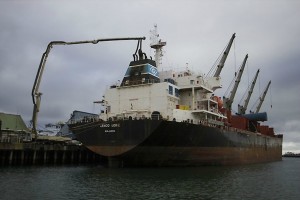
Dock workers at West Coast ports, such as the Port of Long Beach, may engage in work "slowdowns" during ongoing contract negotiations. Photo credit: Port of Long Beach.
An uneasy truce now prevails at ports along the West Coast, but a threatened strike by dock workers from San Diego to Seattle could post a serious threat to automakers and auto buyers alike, potential creating a serious shortage of vehicles imported from Asia.
Negotiations for a new labor contract covering nearly 20,000 dockworkers of the International Longshore and Warehouse Union (ILWU) at 29 West Coast ports will continue despite the July 1 expiration of the existing, coast-wide labor agreement, both sides said this week.
“While there will be no contract extension, cargo will keep moving, and normal operations will continue at the ports until an agreement can be reached between the Pacific Maritime Association (PMA) and ILWU,” negotiators said in a joint statement issued after the old contract expired.
However, while the work will go on, slowdowns are possible, some observers noted.
Both sides understand the strategic importance of the ports to the local, regional and U.S. economies, and are mindful of the need to finalize a new coast-wide contract as soon as possible to ensure continuing confidence in the ports and avoid any disruption to the jobs and commerce they support, the statement said.
The West Coast ports such as Long Beach, Oakland and Seattle-Tacoma are the primary landings for the more than 2.4 million vehicles exported annually to the U.S. by Japanese and Korean automakers. Moreover, the West Coast ports are key conduits for a long list of components, including engines, transmissions and wheels that are made in China, Japan and South Korea used as assembly plants across North America.
A West Coast port strike by the ILWU would have a multibillion-dollar impact on a still-shaky U.S. economy, according to a study commissioned by the National Federation of Retailers and National Association of Manufacturers.
“A protracted dispute between the negotiating parties could lead to reduced or shuttered terminal operations for an extended period,” the study warned. “If such disruptions occur, the economic impact would be significant and widespread.”
(Hurricane Arthur could dampen record holiday driving plans. For more, Click Here.)
Even a five-day stoppage would reduce gross domestic product by $1.9 billion a day and disrupt 73,000 jobs, while 10-day stoppage would cut the GDP $2.1 billion a day and could idle 169,000.
The last time the ILWU actually shut down the West Coast ports was in 1971, which was before the U.S. economy had become dependent on the trade with Asia. In 2003, President George W. Bush stepped in to halt a lockout that disrupted port operations up and down the West Coast briefly, but succeeded in severing the auto industry’s supply chain.
(Click Here for details on NHTSA’s push for more record on Chrysler recall.)
The coast-wide labor contract is between employers who operate port terminals and shipping lines represented by the PMA and dockworkers represented by the ILWU. The parties have negotiated a West Coast collective bargaining agreement since the 1930s.
While longshoreman drive imported cars down ramps from specially built roll-on, roll-off ships to holding yards inside West Coast ports, the longshoreman’s job is vastly different from the rough-and-tumble existence depicted in “On The Waterfront.” Longshoremen now operate massive cranes that tower over the ships filled with 40-foot long containers that can be unloaded in a matter of hours in big, highly automated ports, such as Long Beach.
(To see more about new Ford CEO Mark Fields’ pay package, Click Here.)
Under their current contract, ILWU members can make roughly $130,000 per year in their jobs, which are demanding and stressful given the demands to keep cargo moving through major ports.
The ILWU is not only asking for a raise in these talks, but also seeking to broaden its jurisdiction, while port owners are pushing to restructure medical benefits. The union is one of the last unions to have “first dollar” medical coverage included in their contract. ILWU members pay next-to-nothing for health-care coverage, a practice that was common decades ago but has become increasingly rare in the American workplace.
